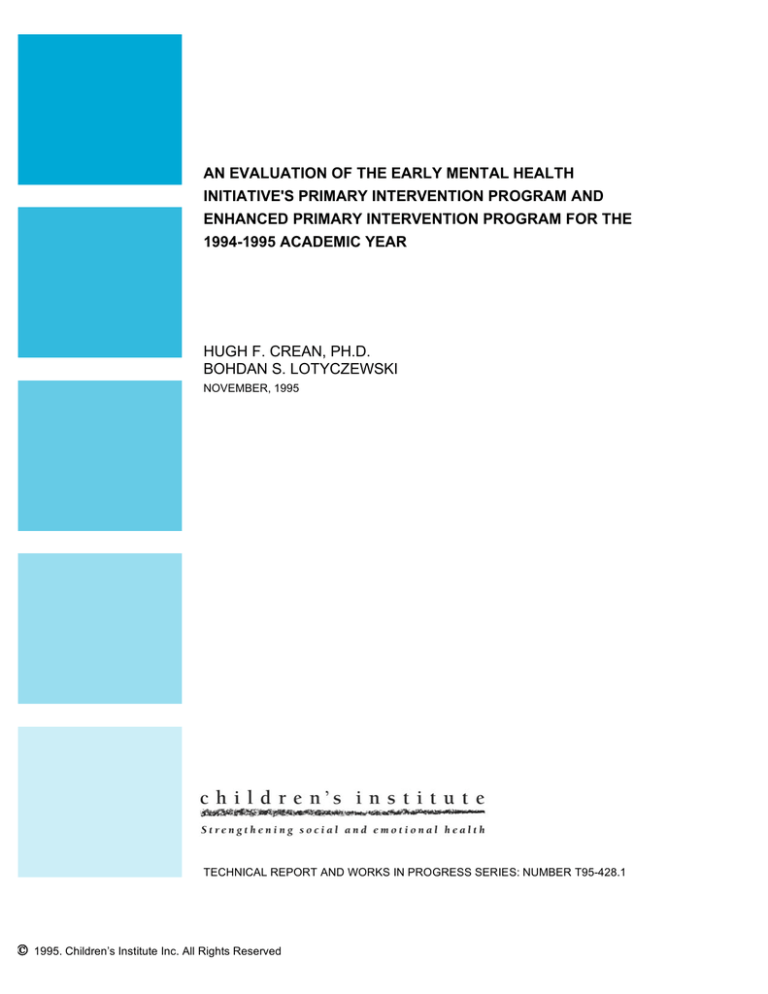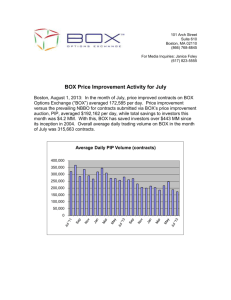
AN EVALUATION OF THE EARLY MENTAL HEALTH
INITIATIVE'S PRIMARY INTERVENTION PROGRAM AND
ENHANCED PRIMARY INTERVENTION PROGRAM FOR THE
1994-1995 ACADEMIC YEAR
HUGH F. CREAN, PH.D.
BOHDAN S. LOTYCZEWSKI
NOVEMBER, 1995
TECHNICAL REPORT AND WORKS IN PROGRESS SERIES: NUMBER T95-428.1
1995. Children’s Institute Inc. All Rights Reserved
EXECUTIVE SUMMARY
The Primary Mental Health Project, Inc., in collaboration with the
California Department of Mental Health and over 180 California
school districts, conducted an evaluation assessing the
effectiveness of the Primary Intervention Program (PIP) and the
Enhanced Primary Intervention Program (Enhanced PIP) models
of the State of California's Early Mental Health Initiative (EMHI).
PIP is a school-based early intervention program for prekindergarten through third grade students who are experiencing
minor school adjustment difficulties. Enhanced PIP models require
the inclusion of the traditional PIP components as well as
integrating additional program components. While participating in
either of the programs, students receive services from carefully
selected and trained paraprofessionals who work under the close
supervision of mental health professionals. Each paraprofessional
works to foster a healthy self-concept and to develop social skills
in the child-skills necessary for improving social and school
adjustment. The programs are based at elementary school sites
and are provided through a cooperative effort between the school
districts and the cooperating mental health entities.
The impact of the PIP and Enhanced PIP programs was evaluated
for the 1994-95 school year utilizing data from 185 California
school districts. Significant positive results were found using
teacher and mental health professional rated indices of adjustment
change for the children. Eighty-four percent of the 185 participating
districts evidenced significant decreases in adjustment difficulties
(e.g., acting-out, shy/anxious or withdrawn and learning problems)
as well as increases in adaptive competencies (e.g., frustration
tolerance, peer social skills, assertive social skills, and task
orientation). There were no significant differences in the amount of
change witnessed in PIP versus Enhanced PIP students-the
programs appear to be equally effective.
Over 27,000 children were served-approximately 24,500 were
seen individually (averaging 11. 6 individual contacts) and 1,100
children were seen in small group settings (for an average of6.7
group contacts). The average length of contact was 30 minutes.
Descriptive information regarding demographic and individual
characteristics of the children supported the early intervention
focus of the programs and documented the risk status of those
children served. PIP and Enhanced PIP were found to be equally
effective for boys and girls; for children from urban, suburban, and
Note
For full transcript please contact customer service: (585) 295-1000 x 256
1995. Children’s Institute Inc. All Rights Reserved
rural backgrounds; for children of differing socioeconomic status
and ethnic backgrounds; and for children from a variety of parental
constellations. Success in the programs does not depend on the
number of contacts with the paraprofessional, once a minimum of
8 contacts has occurred.
Results from the 1994-95 evaluation continue to provide strong
support for the efficacy of the PIP and Enhanced PIP programs.
Teachers and mental health professionals clearly indicated
significantly better end-of-year school and social adjustment for
children served. These results indicate strongly that these EMHI
programs, as currently implemented in California, are making a
positive contribution to the school and social adjustment of
students in grades pre K through three.
Note
For full transcript please contact customer service: (585) 295-1000 x 256
1995. Children’s Institute Inc. All Rights Reserved


